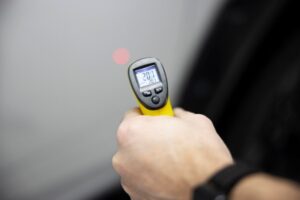Sound measurement stands as a linchpin in fields such as engineering, music, and health, playing a pivotal role in maintaining acceptable noise levels, ensuring high-quality audio production, and safeguarding against health hazards like hearing loss.
The advent of the decibel meter Philippines, also known as sound level meters, has been instrumental in achieving precise sound measurements, catering to safety and quality considerations across various domains.
Types of Decibel Meters
-
Portable Decibel Meters:
- Utility: Compact and handheld, crucial for sound engineers, environmental scientists, and health and safety professionals.
- Application: Monitors and controls noise pollution effectively in various environments.
-
Desktop Decibel Meters:
- Features: Compact, user-friendly, and effective devices for measuring sound levels.
- Usage: Commonly employed in recording studios, sound tests in science labs, and noise pollution monitoring.
-
Smartphone-Based Decibel Meters:
- Design: Digital applications converting smartphones into portable sound-level meters.
- Versatility: Used across diverse fields, from music production to workplace safety, facilitating effective noise management.
-
Top-Quality Decibel Meters:
- Importance: Crucial tools for accurate sound measurement, offering precision, reliability, and durability.
- Applications: Invaluable in audio production, environmental noise control, and occupational health and safety.
Detailed Analysis of Each Top-Quality Decibel Meter
Analyzing top-quality decibel meters involves scrutinizing factors such as accuracy, range, response speed, ease of use, robust design, advanced features like data logging, and overall reliability. Each product offers specific advantages catering to various audio measurement needs.
Comparison of Different Decibel Meters
Decibel meters, ranging from basic models like the Reed R8060 to high-end models like the Bruel & Kjaer 2270, serve different audio measurement needs. Variations in performance and accuracy make these tools adaptable to diverse professional requirements.

Factors to Consider When Buying a Decibel Meter
-
Accuracy of the Meter:
- Universal Standards: Ensured by international standards and redefined by the International Committee for Weights and Measures.
- Precision: Worldwide precision and reliability were established in 1983.
-
Ease of Use and Portability:
- Crucial: In today’s tech-driven world, simplicity in interfaces and lightweight, compact designs enhance productivity.
- Flexibility: Enables users to work from almost anywhere, providing convenience and flexibility.
-
High Quality and Durability:
- Vital Attributes: Signify superior craftsmanship and materials, ensuring the longevity of the product.
- Consumer Benefit: Maximizes the value of the product, providing consumers with long-lasting and reliable tools.
-
Advanced Features and Capabilities:
- Innovative Traits: Optimize systems, software, or machinery, enabling greater efficiency, productivity, and real-time analytics.
- Revolutionizing Industries: Heightened performance standards, AI integration, and user-friendly interfaces contribute to the industry revolution.
-
Price and Value for Money:
- Cost Assessment: Price determines the cost of a product or service.
- Value Evaluation: Value for money assesses if the product’s worth meets or exceeds the price paid.
Advantages of Using Top-Quality Decibel Meters
-
Enhanced Accuracy and Precision:
- Impact: Significantly impacts sectors such as science, technology, and engineering.
- Benefits: Allows for reliable data collection, better predictions, stable operations, and improved product quality.
-
Improved Ease and Efficiency:
- Advancements: Technology improvements have enhanced ease and efficiency across various sectors.
- User Interface: Facilitates effortless operations, eliminates unnecessary stress, and considerably increases productivity.
-
Increased Durability and Reliability:
- Technological Advances: Bring increased durability and reliability to products.
- Consumer Trust: Increases trust in the product’s longevity, reducing overall costs and increasing savings.
Role of Decibel Meters in Sound Engineering
-
Importance in Setting Up Proper Audio Levels:
- Crucial: For achieving high-quality sound production.
- Professional Standard: Prevents audio distortion, provides clearer sound, enhances listener experience, and prevents damage to speakers.
-
Utility in Tracking Unwanted Noise Levels:
- Significance: In industries like construction, aviation, and urban planning.
- Aids: In monitoring and controlling noise pollution, enhancing environmental quality, and public health.
-
Contribution to Maintaining a Safe and Comfortable Acoustic Environment:
- Crucial: In maintaining a safe and comfortable environment.
- Benefits: Reduces noise pollution, enhances auditory comfort, and improves overall health and well-being.
In conclusion, decibel meters play a crucial role in precision sound measurement, providing an array of tools catering to different professional needs. The advancements in technology and the variety of features in top-quality decibel meters contribute to increased accuracy, ease of use, and efficiency across various sectors, ultimately fostering safer and more comfortable acoustic environments.

